Samsung today has launched their new enthusiast class SSD family, the SSD 850 PRO. The SSD 850 PRO is the successor to the 840 PRO and comes with quite a few new updates. The 850 PRO is powered by Samsung’s 32-layer 3D V-NAND technology, the first such drive to hit the market. Comparing 3D NAND technology to traditional 20 nm planar NAND flash, 3D can deliver up to two times the density and write speed performance. The capacity points for the 850 PRO run from 128GB to 1TB with DRAM cache memory going up to 1GB LPDDR2. The drives come with Samsung’s newest version of Samsung Magician, version 4.4 and all drives include a 10-year warranty.
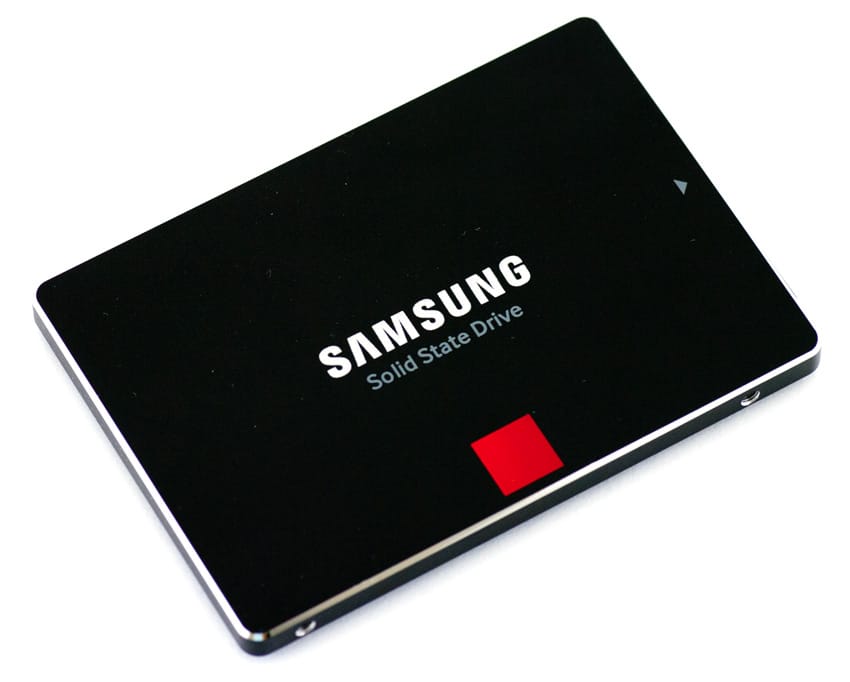
Given the enthusiast focus, the Samsung SSD 850 PRO is all about performance. The drive boasts some pretty impressive speeds. The claimed sequential read speeds are 550MB/s across the board from 128GB to 1TB, with the sequential write speeds ranging from 470MB/s for the 128GB to 520MB/s for all the other drives. In 1QD the 850 PRO has a consistent read throughput of 10,000 IOPS and a consistent write throughput 36,000IOPS. In the 32QD, the 850 PRO had consistent read throughputs of 100,000IOPS and consistent write throughputs of 90,000IOPS.
Aside from the performance claims, the Samsung SSD 850 PRO reinforced its RAPID mode with Magician 4.4. The drive also has enhanced endurance, built to handle a 40GB workload daily, and is backed by a 10-year warranty. The 850 PRO has the same data encryption feature of the 840 EVO and it also includes an AES 256-bit hardware-based encryption engine to secure data without performance degradation. And the Samsung SSD 850 PRO is one of the most energy-efficient drives on the market with a 40% lower active write power than 840 PRO due to V-NAND technology.
The Samsung SSD 850 PRO will be available this month in 128GB, 256GB, 512GB, and 1TB capacities and is backed by a 10-year warranty. Suggested MSRP at launch is $129.99, $229.99, $429.99 and $729.99 for the 128GB, 256GB, 512GB and 1TB capacities respectively. Our review units include 1TB and 128GB capacities.
Samsung SSD 850 PRO specifications:
- Capacities:
- 128GB (MZ-7KE128BW)
- 256GB (MZ-7KE256BW)
- 512GB (MZ-7KE512BW)
- 1TB (MZ-7KE1T0BW)
- Interface: Serial ATA 6Gb/s (compatible with SATA 3Gb/s and SATA 1.5Gb/s)
- Form Factor: 2.5”
- NAND Flash Memory: Samsung 32 layer 3D V-NAND
- DRAM Cache Memory:
- 256MB (128GB)
- 512MB (256GB & 512GB)
- 1GB (1TB) LPDDR2
- Claimed Performance
- Sequential Read: Up to 550MB/s
- Sequential Write: Up to 520MB/s
- Random Read (4KB, QD32):
- Max. 100,000IOPS
- Reliability: 2,000,000 hours Mean Time Between Failures (MTBF)
- TBW: 150TBW (30,000 P/E Cycles)
- Power Consumption:
- Active Read/Write (Average): 3.3Watt/3.0Watt (1TB)
- Idle: 0.4Watt
- Device Sleep: 2mW
- Temperature:
- Operating: 0°C to 70°C
- Non-Operating: -40°C to 85°C
- Humidity: 5% to 95%, non-condensing
- Vibration: Non-Operating, 20~2000Hz, 20G
- Shock: Non-Operating,1500G, duration 0.5m sec, 3 axis
- Dimensions (LxWxH): (100.00±0.25) x (69.85±0.25) x (6.80±0.20) mm
- Weight Max: 66g (1TB)
- Warranty: 10-year
Design and Build
The Samsung SSD 850 PRO looks almost identical to its predecessor the SSD 840 PRO (reviewed by us here and here). It has a minimalistic, slim design with a flat black top with Samsung branding. The bottom of the drive features a label with all the key information about the drive.
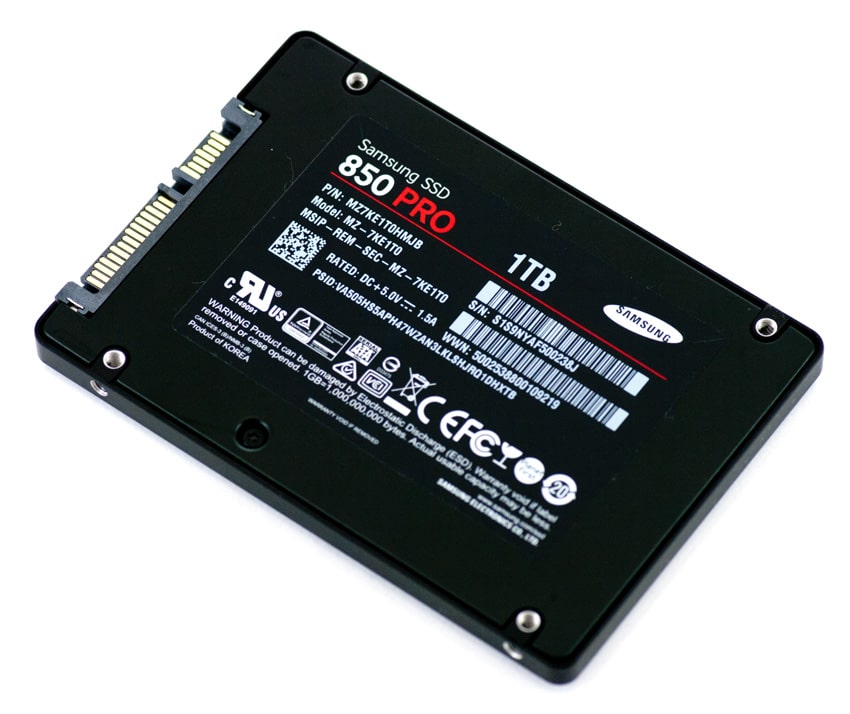
Inside the Samsung SSD 850 Pro, you can see the highly vertically integrated components, from the Samsung DRAM, to the Samsung V-NAND to the Samsung SSD controller. This tight level of integration allows Samsung to drive incredible value, alongside exceptional performance. The V-NAND specifically allows Samsung to hit a "reset" button on the ever-shrinking NAND P/E cycle count that decreases with each die shrink. While others in the market area dealing with 500, 1,000, or 3,000 P/E cycles, Samsung is up to 30,000 P/E cycles with the 850 Pro.
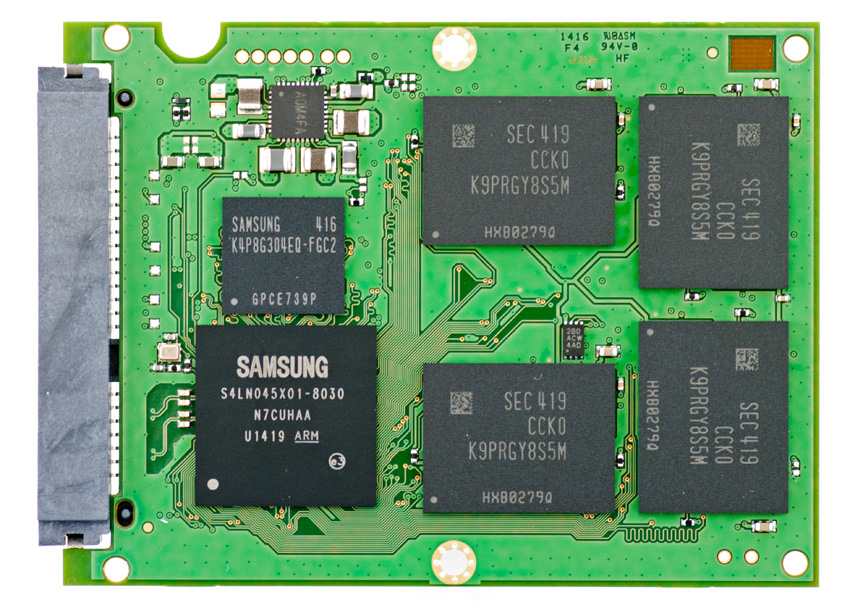
Looking inside the 1TB Samsung SSD 850 Pro we see the 8 128GB 32-layer 3D NAND packages, 1GB of LPDDR2 memory, as well as the 400MHz Samsung MEX S4LN045X01-803 controller. This controller is shared with the SSD 840 EVO and the 845DC EVO as well.
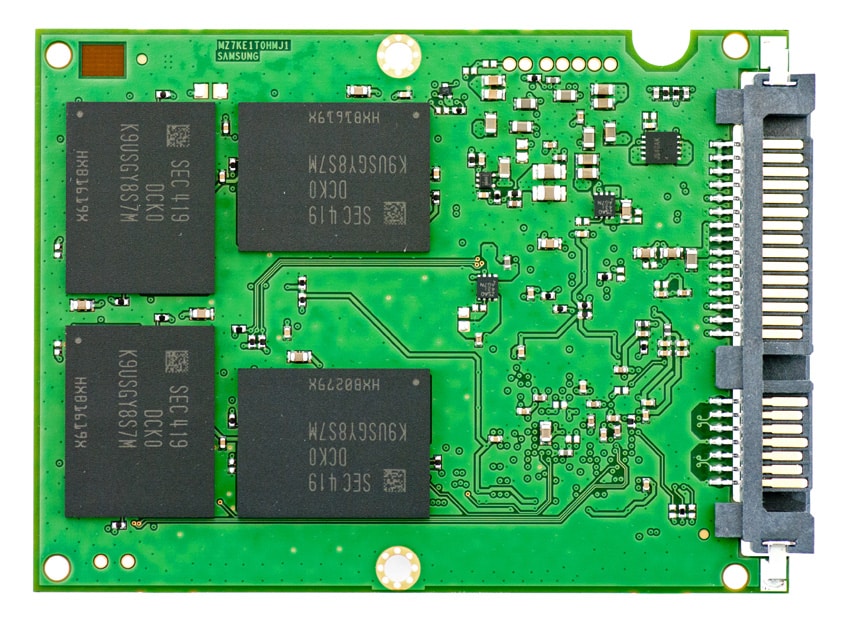
Consumer Synthetic Benchmarks
All consumer SSD benchmarks are conducted with the StorageReview client testing platform. The comparables used for this review include:
- Samsung SSD Evo (250GB, 400MHz Samsung 3-core MCX controller, Samsung 1x nm Toggle NAND Flash, SATA)
- OCZ Vertex 460 (240GB, Indilinx Barefoot 3 BF3-M10, Toshiba 19nm MLC Flash, SATA)
- Crucial/Micron M550 (1TB, 20nm 64Gb, 128Gb MLC, Marvell 88SS9189 Controller, SATA)
- Crucial MX100 (512GB, Marvell 88SS9189, 16nm 128Gb/20nm 128Gb, SATA)
- SanDisk Extreme Pro (960GB, SanDisk 1Ynm, eX2 ABL MLC Flash, SATA)
- SanDisk Extreme Pro (480GB, SanDisk 1Ynm, eX2 ABL MLC Flash, SATA)
- Samsung SSD 840 Pro (512GB, 3-core MDX controller (300MHz), 2x-nm class DDR2 toggle-mode NAND, SATA)
- Intel SSD 730 (480GB, PC29AS21CA0 MLC, Intel 20nm NAND Flash, SATA)
All IOMeter figures are represented as binary figures for MB/s speeds.
Our first test measures 2MB sequential performance. Both the Samsung SSD 850 PRO 128GB and 1TB performed very well, posting read speeds of 512.66/517.85MB/s respectively, and write speeds of 453.23/466.63MB/s respectively. The 850 PRO 1TB being the overall top performer with read speeds and the 128GB was in the top five. With write speeds the 850 PRO came in middle to bottom.
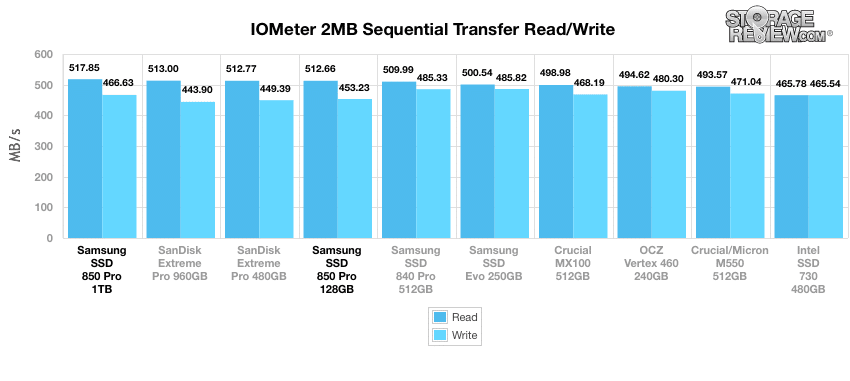
Moving to our 2MB random transfer performance tests, the 850 PRO 128GB scored 470.66MB/s read and 458.64MB/s write, while the 1TB model posted 483.18MB/s read and 467.52MB/s write. Both the read and the write activity fall about in the middle of the pack.
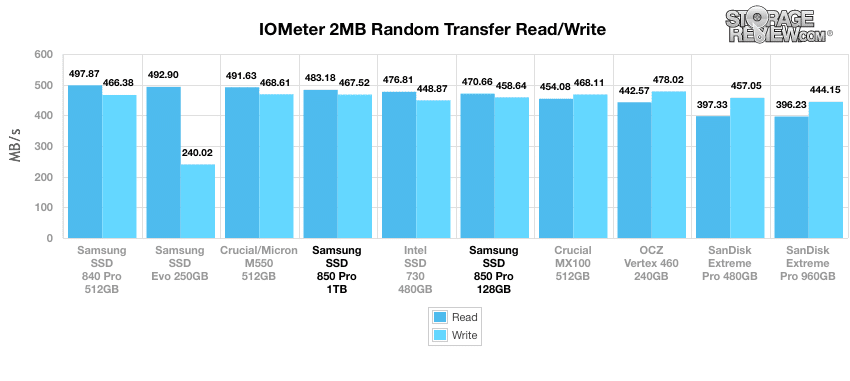
In IOMeter’s random 4K read and write test the SSD 850 PRO drives perform near the top with the 128GB scoring 34.52MB/s read and 82.88MB/s write, while the 1TB scored 34.17MB/s read and 80.42MB/s write.
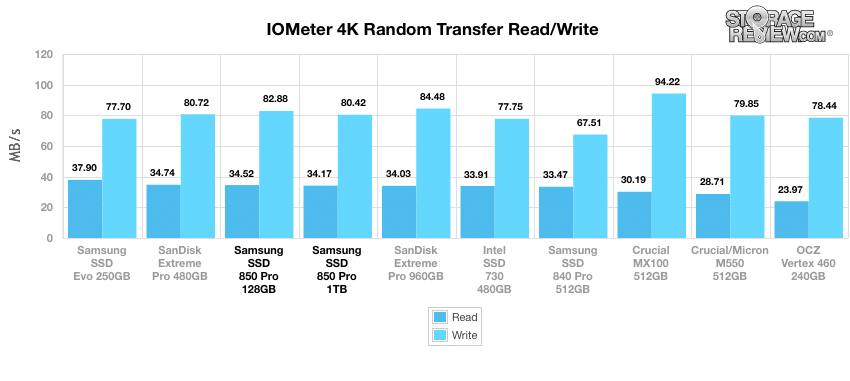
Our random 4k test pushes hard on the drives, the 850 PRO drives performed very well, with 8,837IOPS read and 21,218IOPS write for the 128GB model. The 1TB capacity showed similar results with 8,748IOPS read and 20,587IOPS write.
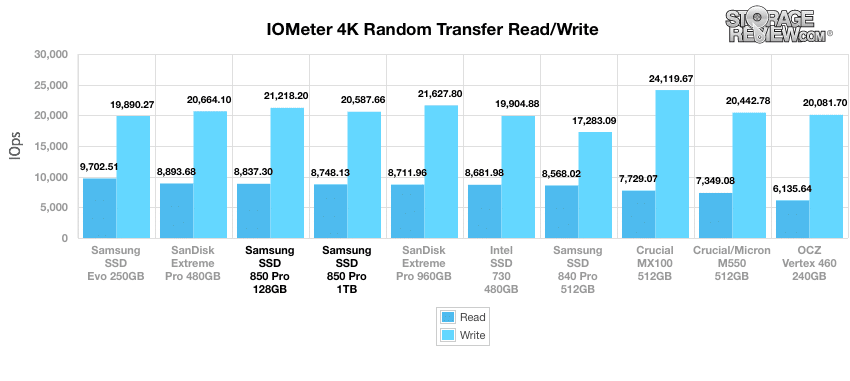
Comparing write latency, the 850 PRO SSDs ranked near the top of the leaderboard for average latency but max latency the 128GB had a massive spike upward while the 1TB performed second best overall.
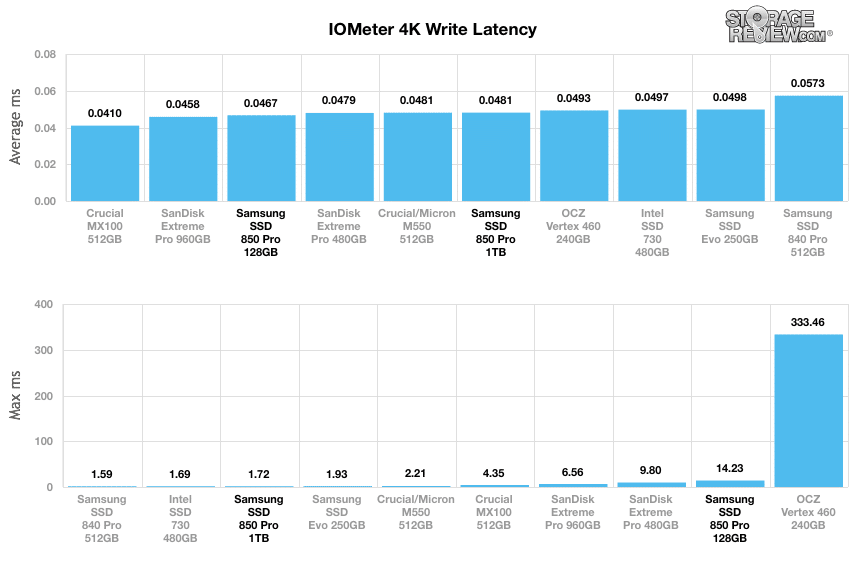
In our next 4K test, we move to a workload with 100% write activity, which scales from 1QD to 64QD. In the aligned write setting, the 850 PRO 128GB scaled from 20,980IOPS up to 90,660IOPS, while the 1TB model scaled from 20,765IOPS up to 90,539IOPS; both 850 PRO drives placed at the top of the leaderboard.
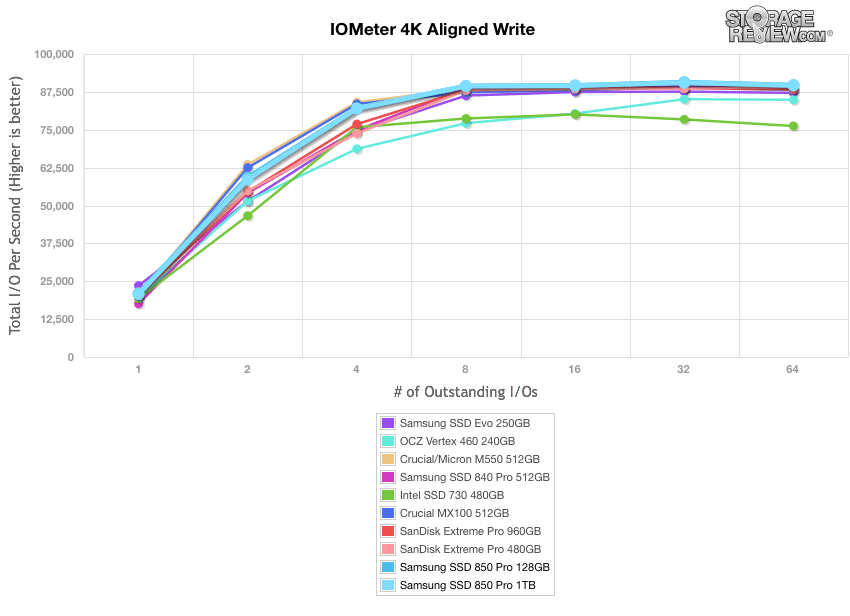
The Extreme PRO SSDs showed off their great performance again in aligned read activity, posting a blistering 99,436IOPS and 99,601IOPS by the 64QD for the 128GB and 1TB, respectively. Once again, both drives ranked at the top of the pack along with the SanDisk Extreme PRO drives.
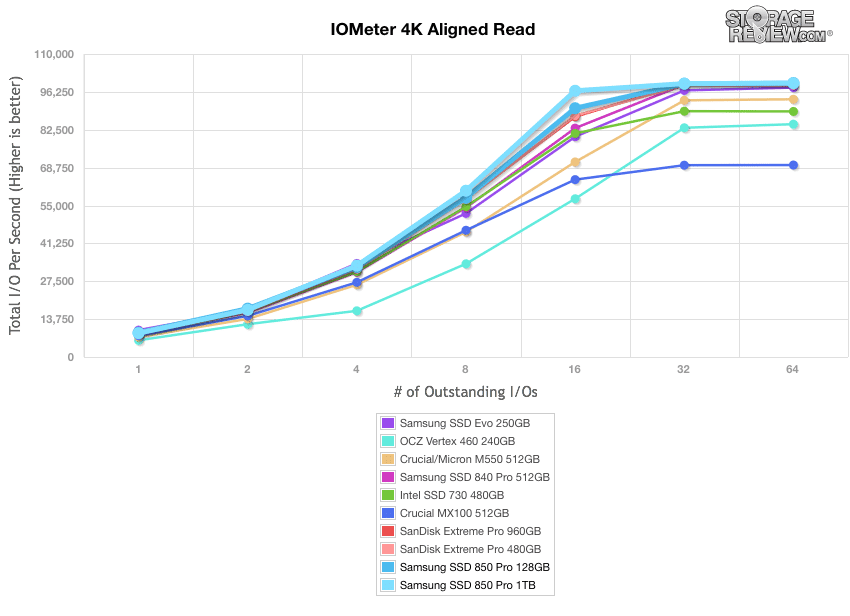
Our final consumer synthetic benchmarks compare the drives in a series of mixed server workloads with a queue depth from 1 to 128. Each server profile has a strong bias towards read activity, ranging from 67% read with the database profile to 100% read in the web server profile.
The database profile features a 67% read and 33% write workload focusing on transfers around 8K in size. Once the queue depth rises above two, the SSD 850 Pro scored Q128 results of 43,170IOPS and 56,484IOPS, for the 128GB and 1TB respectively.
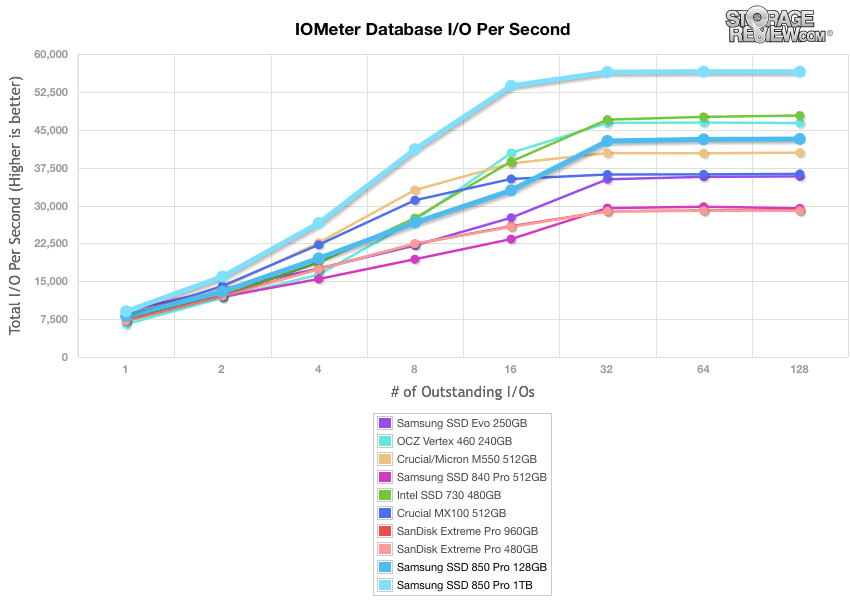
The web server profile is read-only, with transfer sizes ranging from 512B to 512KB. The 850 PRO drives ranked at the top of the pack with the 1TB coming out on top overall.
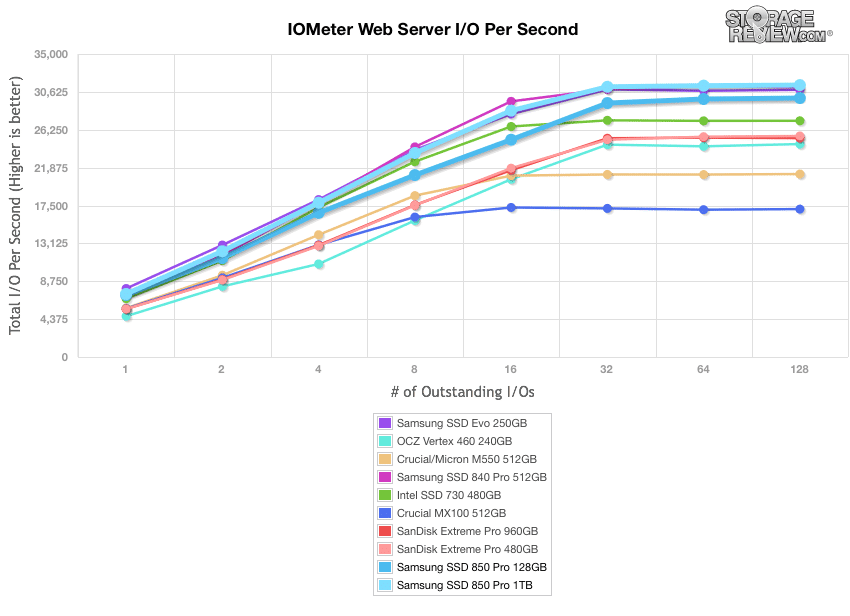
The file server profile has 80% read and 20% write workload spread out over multiple transfer sizes ranging from 512-byte to 64KB. The 850 PRO 128GB posted 23,905IOPS at 128QD while the 1TB showed 32,342IOPS. Both running near the top of the pack.
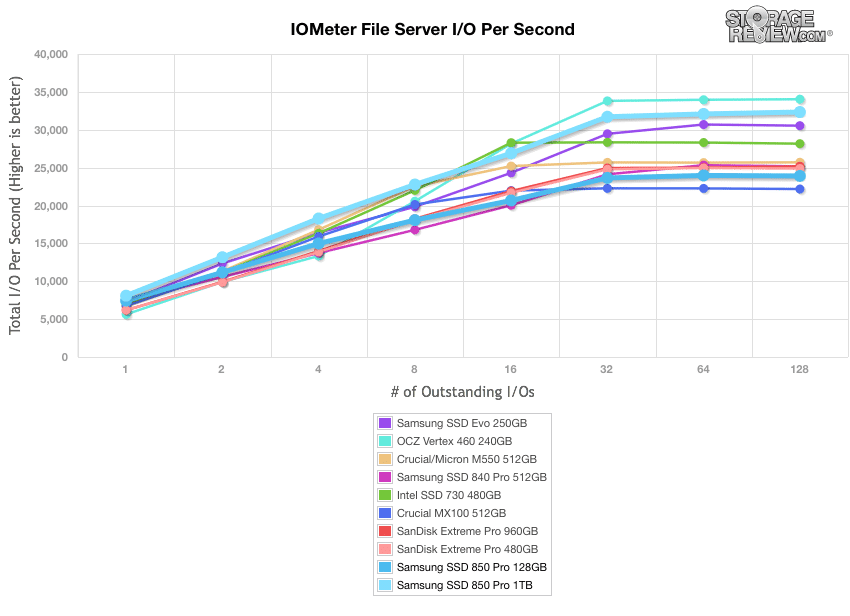
The last profile looks at workstation activity, with a 20% write and 80% read mixture using 8K transfers. By Q128, the two 850 PRO 128GB performed near the bottom of the pack, while the 1TB performed at the higher end.
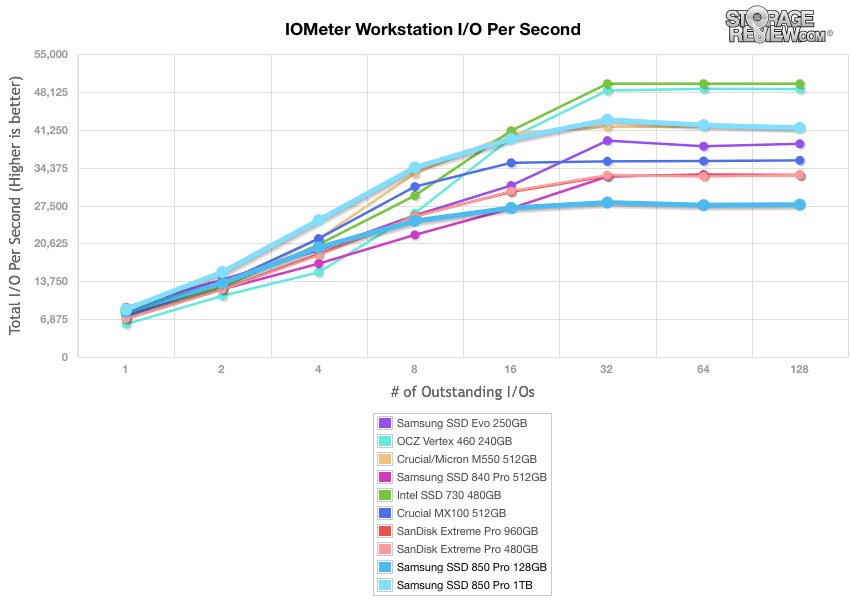
Consumer Real-World Benchmarks
While the results of synthetic benchmarks are important to identify the key strengths and weaknesses of a drive, performance in these tests does not always translate directly into real-world situations. To get a better idea how the Samsung SSD 850 Pro will handle itself in the field we will chart StorageMark 2010 HTPC, Productivity, and Gaming traces against comparable drives. Higher IOPS and MB/s rates with lower latency times are preferred.
The first traced is based on use as a Home Theater PC (HTPC). The test includes playing one 720P HD movie in Media Player Classic, one 480P SD movie playing in VLC, three movies downloading simultaneously through iTunes, and one 1080i HDTV stream being recorded through Windows Media Center over a 15 minute period.
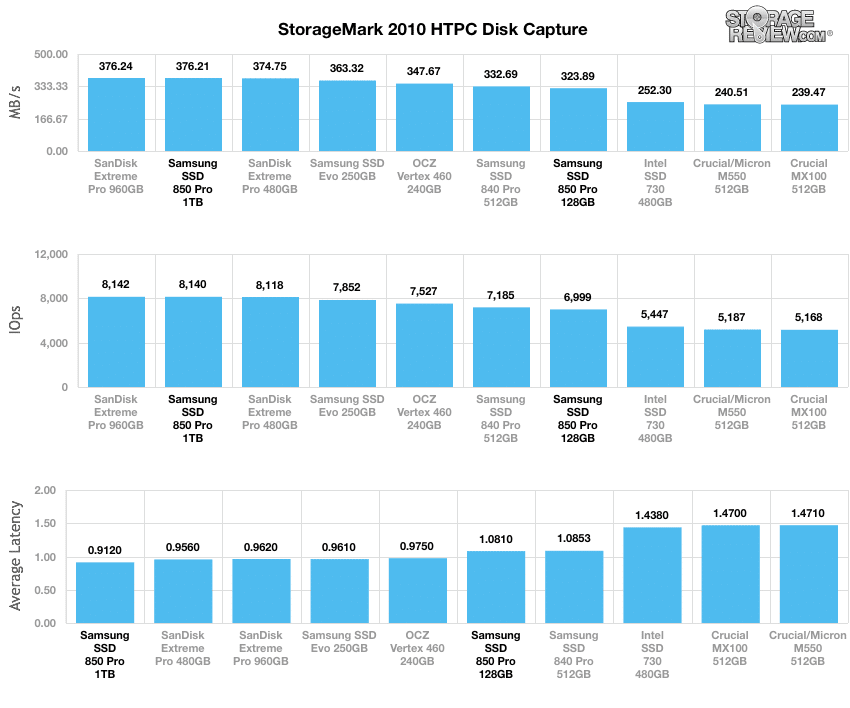
In our HTPC profile, the 850 PRO SSDs showed pretty impressive results, ranking at or near the very top of the pack in all of our tests with 8,140/6,999IOPS, 376.21/323.89MB/s, and an average latency of 0.912/1.081ms for the 1TB and 128GB, respectively.
The next trace simulates disk activity in an office workstation or productivity scenario. This test includes three hours of operation in an office productivity environment with 32-bit Windows Vista running Outlook 2007 connected to an Exchange server, web browsing using Chrome and IE8, editing files within Office 2007, viewing PDFs in Adobe Reader, an hour of local music playback, and two hours of streaming music via Pandora.
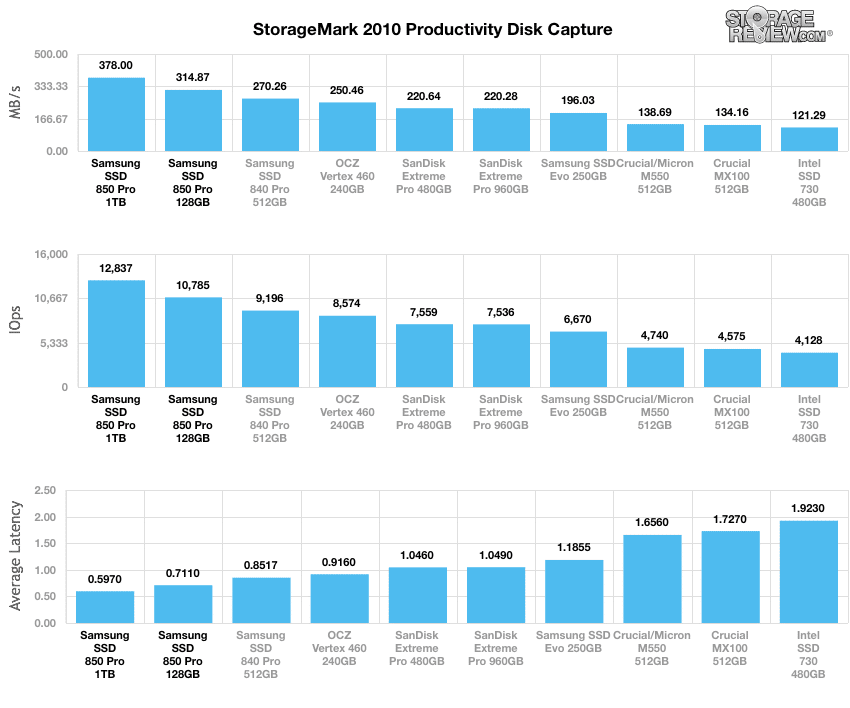
In our Productivity trace, the two Samsung 850 PRO SSDs crushed the rest of the pack with 12,837/10,785 IOPS, 378/314.87MB/s and an average latency of 0.597/0.711ms for the 1TB and 128GB, respectively.
The final consumer real-life benchmark simulates disk activity during gaming. This simulation taxes the drive’s read performance, with 6% write operations and 94% read operations. The test consists of a Windows 7 Ultimate 64-bit system pre-configured with Steam, with Grand Theft Auto 4, Left 4 Dead 2, and Mass Effect 2 already downloaded and installed. The trace captures the heavy read activity of each game loading from the start, as well as textures as the game progresses.
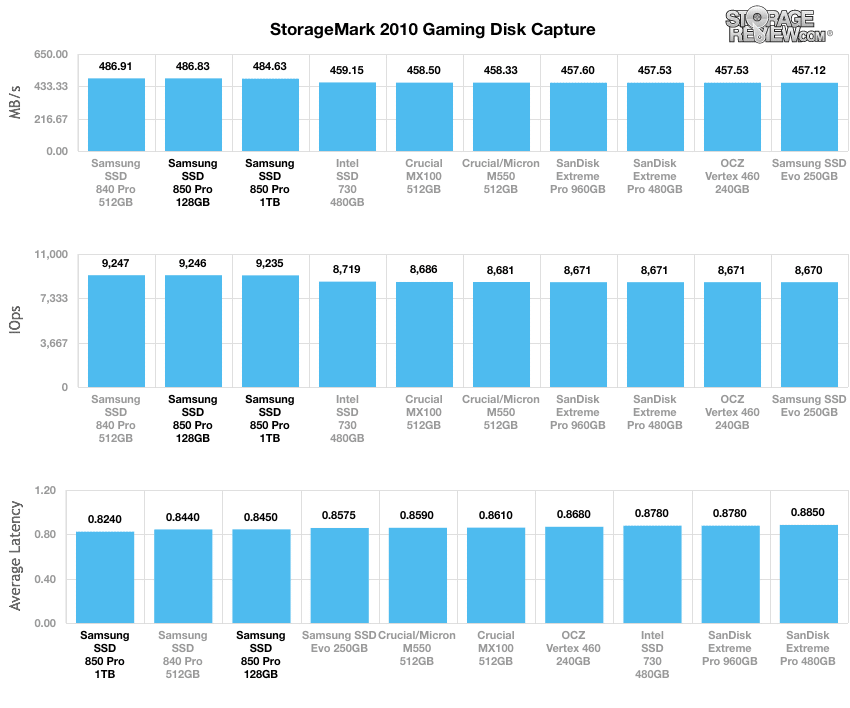
The SSD 850 PRO drives performed either at the top or near the top throughout though most of the drives ran very close.
Power Consumption
Low idle power consumption is vital when it comes to SSDs as most of their lifespan is in the idle state.
That said, our power tests showed very low idle power consumption from the SSD 850 PRO at 0.32W and 0.29W for the 1TB and 128GB respectively. The power consumption for read, write, and startup is slightly more than its predecessor, though the 1TB had lower power consumption on read and random read than the 840 PRO. The SSD 850 PRO consumes significantly less power than the other drives tested.
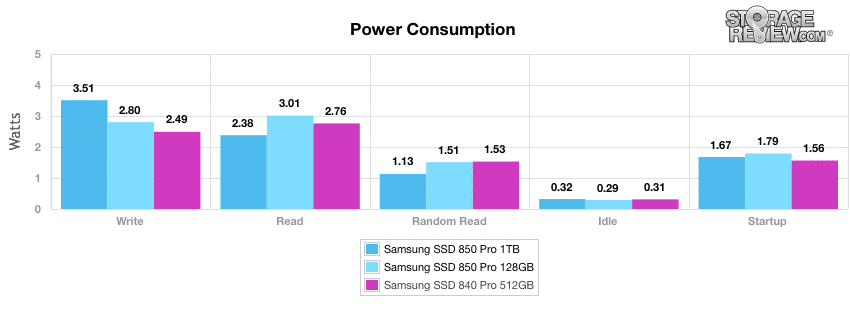
Conclusion
The Samsung SSD 850 PRO is a 2.5” form factor SSD for enthusiasts that is the first drive to be powered by 3D virtual NAND technology. It comes in capacities ranging from 128GB up to 1TB. Not only does it boasts some pretty impressive speeds, it has a high endurance, secure encryption, RAPID mode to enhance user experience, and a 10-year warranty. It also claims to be one of the most energy efficient drives on the market, which our testing proves to be mostly true with its very low idle power usage.
As far as performance, the SSD 850 PRO either posted at the top or near the top in most of our application and synthetic benchmarks. In our synthetic tests, the 850 PRO drives were at the top of the leaderboards in our 2MB sequential workload and near the top in the random workload of the same size. In our 4K aligned testing the 850 PRO came in at the top of the pack. And in the synthetic benchmark tests the 850 PRO drives either came in at the top or near the top each time, with the exception of the workstation test.
In our consumer real-world benchmarks the 850 PRO really again ran either at or near the top of the pack. In our productivity profile, the 850 PRO drives blew away all of the other drives where it posted 12,837/10,785IOPS, 378/314.87MB/s and an average latency of 0.597/0.711ms for the 1TB and 128GB, respectively. In the other two tests it also performed well, coming in near the top on HTPC profile and running with the other drives in the gaming profile.
There's little to complain about with the 850 PRO. The worst offense is the write power consumption is higher than the 840 Pro on our test bench, far from a 40% drop Samsung suggested, but our numbers do match the spec sheet quote. The pricing at launch also makes it the most expensive consumer SSD out there, but that's day one pricing that falls rapidly with volume shipments. In the end, the SSD 850 PRO re-asserts Samsung's dominance in the SSD space, as if further evidence was required. With this refresh and the migration of their mainstream EVO to V-NAND soon, Samsung's flash portfolio is one to be admired and worthy of consumer's dollars.
Pros
- Top-in-class performance
- 10-year warranty
- Low overall power consumption
Cons
- Write power consumption higher than 840 Pro
The Bottom Line
The Samsung SSD 850 PRO gives enthusiasts about everything they could want in a single SATA SSD. Like drives before it, Samsung has infused the SSD 850 PRO with new technology to make it a class leader in terms of performance, endurance and warranty.
Samsung SSD 850 PRO at Amazon



 Amazon
Amazon